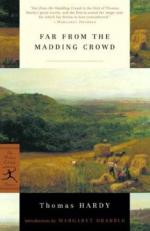|
This section contains 6,221 words (approx. 21 pages at 300 words per page) |

|
SOURCE: Mistichelli, William. “Androgyny, Survival, and Fulfillment in Thomas Hardy's Far from the Madding Crowd.” Modern Language Studies 18, no. 3 (summer 1988): 53-64.
In the following essay, Mistichelli discusses themes of androgyny in Far from the Madding Crowd,, concluding that, in Gabriel Oak, Bathsheba finds a mate who will help her to fulfill her true humanity.
In Far From The Madding Crowd uncertainty or ambiguity about sexual identities and roles becomes a recurring motif, especially in connection with the heroine, Bathsheba Everdene. Time and again in the novel, one encounters situations where outright confusion or some reversal of expectations about Bathsheba's sex produces significant revelations about her character and introduces important turns in her life. When she first comes to meet her workers as owner of the Weatherbury farm, she is referred to as Sir by Joseph Poorgrass (Far From The Madding Crowd 113; ch. 10). Another of her workers elsewhere separates...
|
This section contains 6,221 words (approx. 21 pages at 300 words per page) |

|


